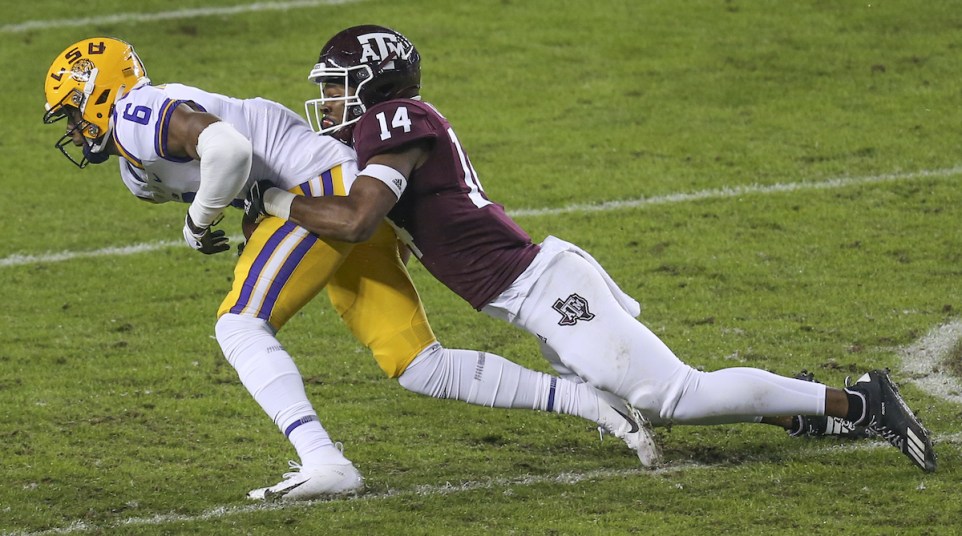
LSU football: Tigers lost to Texas A&M because they couldn't block Texas A&M
If you can’t block the other team, you’re going to have a very difficult time beating them.
If you can’t block the other team, you can’t run the ball effectively.
If you can’t run the ball effectively and you can’t protect your quarterback (or quarterbacks), you can’t pass the ball effectively.
If you can’t run the ball effectively or pass it effectively, you’re not going to have a chance to win unless you’re virtually perfect on defense and special teams.
LSU wasn’t perfect on defense and special teams in their 20-7 loss to Texas A&M on Saturday night.
The Tigers played their best defensive game of the season, though they did allow 141 rushing yards, including a 52-yard touchdown, to Isaiah Spiller.
The special teams weren’t great, as Cade York missed a 34-yard field goal and the punt return unit lost a fumble, though it didn’t lead to points.
But LSU couldn’t run effectively or pass effectively because they couldn’t block the Aggies.
No. 5 Texas A&M beat LSU because their front-line defenders dominated the Tigers’ blockers. They dominated them for 60 minutes. They decided the outcome.
The fact that the score was as close at it was, that the deficit was a mere 13-0 at halftime and no worse than 20-0, was a tribute to the LSU defense.
Be Pelini’s much-maligned defense harassed Kellen Mond throughout the game, played smart throughout the game, tackled well throughout the game and kept LSU in the game.
The Tigers turned the ball over 3 times and didn’t take it away. The Aggies possessed the ball for 7 more minutes than the Tigers did. And yet LSU held A&M to 267 total yards, the same number that LSU gained.
LSU ran the ball 25 times. That produced 36 yards.
Head coach Ed Orgeron replaced an ineffective TJ Finley with Max Johnson at quarterback in the 1st quarter. He replaced an ineffective Johnson with Finley in the 2nd quarter. He replaced an ineffective Finley with Johnson in the 3rd quarter.
It didn’t matter, though Johnson did produce a touchdown in the final minute.
It didn’t matter because LSU couldn’t block Texas A&M.
The Tigers reached the Aggies 35 on their 1st possession of the game. But on 4th-and-1, they couldn’t block A&M, and Tyrion Davis-Price was stopped for no gain.
They had other scoring threats while the outcome was still in doubt, but York missed the field goal, a pass from Finley to Kayshon Boutte that was ruled a touchdown on the field was overturned on replay, and Finley followed with an interception.
But in the end, none of that mattered, either.
The defense kept the score manageable, but the offense was never going to score enough points to take advantage because there were too many Aggies penetrating the Tigers’ backfield, too many Aggies clogging the line of scrimmage, too many Aggies making Finley and Johnson uncomfortable.
LSU has had trouble running the football effectively in a few games this season. At times, offensive coordinator Steve Ensminger has deserved some of the blame for not committing to or staying with the running game sufficiently — or both.
But this isn’t on Ensminger. He tried to run the ball, he clearly wanted to run the ball. He tried Davis-Price and he tried John Emery Jr., but neither had anywhere to run.
Ensminger didn’t abandon the running game. The running game abandoned him by putting the 2 young quarterbacks in 2nd-and-long and 3rd-and-long situations.
When the young quarterbacks tried to operate the passing game under those constraints, they got antsy. And they got more antsy when they saw and felt the pass rush from a defense unconcerned about the LSU running game.
LSU lost to Texas A&M because they couldn’t block Texas A&M.
Right now, Texas A&M is a better team than LSU. They have a better record and are rightfully more confident. They have more poise at the quarterback position, even though Mond didn’t play up to his usual standard against LSU.
On Saturday night, the Aggies regularly pushed aside the Tigers blockers and determined the outcome of the game.
